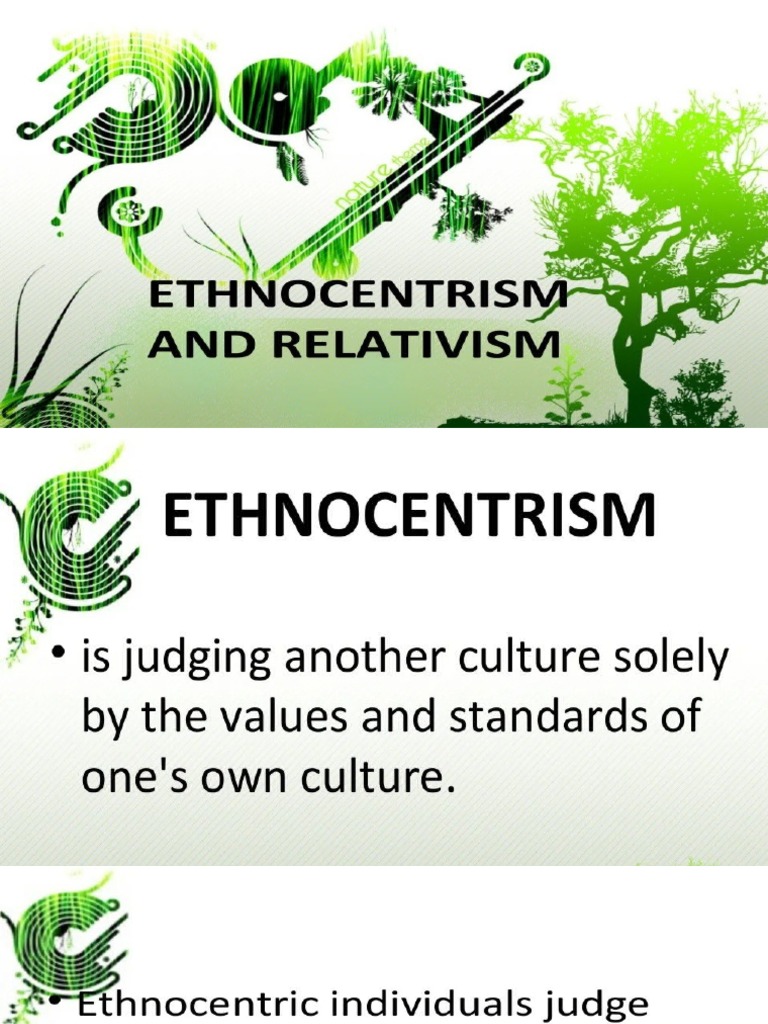In the realm of cultural studies, two fundamental concepts often emerge in discussions of social dynamics: ethnocentrism and cultural relativism. Understanding the distinctions between these two ideologies is paramount for anyone seeking to engage with the complexities of human societies. Ethnocentrism, a term denoting the evaluation of other cultures according to the standards of one’s own culture, contrasts starkly with cultural relativism, which advocates for understanding a culture on its own terms, free from bias. A thoughtful examination of these concepts reveals a rich tapestry of human interaction, laden with potential for growth and change.
Ethnocentrism can be characterized as a natural human inclination, rooted deeply in our psyche. It emerges from the desire to view the world through the lens of one’s own experiences and beliefs. This perspective often results in the judgment that other cultures are inferior, bizarre, or even wrong. Such a viewpoint fosters division, positing a hierarchy of cultures where one is seen as superior. Think of it as an involuntary prism that filters perceptions, distorting our understanding of others. This lens, while ubiquitous throughout history, has often incited conflicts, fueled colonialism, and perpetuated stereotypes.
Moreover, ethnocentrism can manifest in subtle, everyday interactions. It informs the manner in which individuals interpret customs different from their own, often leading to misunderstandings and resentment. Consider a situation where an individual from a collectivist culture interacts with someone from an individualistic one. The former may perceive the latter’s self-promotion as egotistical, while the latter may view the former’s communal approach as limiting. Such misunderstandings can perpetuate strife and discord across cultures, reinforcing entrenched perspectives and impeding cooperation.
Conversely, cultural relativism posits a radical shift in perspective—one that invites openness and empathy. It asserts that no culture is inherently superior to another, and that behaviors, values, and beliefs must be contextualized within their cultural frameworks. Cultural relativism encourages us to suspend our judgments, delving deeply into the sociocultural contexts that shape individual actions and societal norms. This approach can engender a profound appreciation for diversity, compelling us to examine the intricacies of cultural practices without the taint of prejudice.
The implications of cultural relativism are substantial. By embracing this perspective, one can begin to appreciate the rationale behind various cultural customs, however perplexing they may appear. For instance, certain rituals or traditions that may seem antiquated to outsiders are often rich with meaning and significance to those who practice them. Recognizing that cultural practices arise from specific historical and social contexts enriches our understanding of humanity. It transforms curiosity into a powerful tool for connection, fostering dialogue rather than division.
To illustrate the practical differences between these two perspectives, consider the example of dietary practices. In some cultures, eating insects is commonplace and rich in nutritional value, while other cultures frown upon such practices, associating them with uncleanliness. An ethnocentric viewpoint might dismiss insect consumption as gross or unfathomable, while a culturally relativistic approach would seek to understand the ecological, economic, and nutritional factors at play in embracing such a diet. This comparative analysis is revealing; it underscores how dietary norms are often tailored to environmental conditions and cultural heritage.
Therefore, the crux of the debate between ethnocentrism and cultural relativism lies in their respective approaches to understanding cultural diversity. Ethnocentrism, with its rigid and often judgmental framework, limits the possibility for genuine intercultural dialogue. In contrast, cultural relativism opens the door to empathetic engagement and understanding, offering a pathway to navigate the complex global landscape we inhabit.
Nevertheless, cultural relativism is not without its criticisms. Some argue that it can lead to moral relativism, where questionable practices might be condoned under the guise of cultural differences. This contention raises an essential question: how do we maintain respect for cultural diversity while also advocating for universal human rights? The challenge lies in striking a delicate balance—recognizing and valuing cultural practices without compromising ethical standards that uphold human dignity.
The need for a nuanced, balanced perspective could be likened to navigating a bridge. One side embodies ethnocentrism, a solid and seemingly unyielding construct that fosters separation. On the opposite side stands cultural relativism, an expansive view that invites exploration and connection. Yet, traversing this bridge requires courage and a willingness to embrace discomfort. It demands we confront our biases, question our assumptions, and, most critically, learn from those whose lives differ fundamentally from our own.
Ultimately, the differences between ethnocentrism and cultural relativism encode profound implications for how we engage with one another amid a rapidly globalizing world. As communities coexist and navigate the intricacies of modern life, an appreciation for cultural diversity becomes increasingly vital. By promoting an ethos of cultural relativism, societies position themselves not only to foster mutual respect but to tackle the collective challenges that confront humanity—climate change, social injustice, and beyond.
Embracing cultural relativism does not entail abandoning one’s cultural identity; instead, it allows for a more profound connection with the world’s diverse tapestry. It issues a clarion call for curiosity and understanding, urging individuals to look beyond the surface and appreciate the undercurrents that shape human behavior. This journey, while fraught with challenges, offers the promise of empathy and insight. In an era rife with division, there lies an opportunity—a hope for a more harmonious coexistence rooted in respect for the myriad cultures that share our planet.
